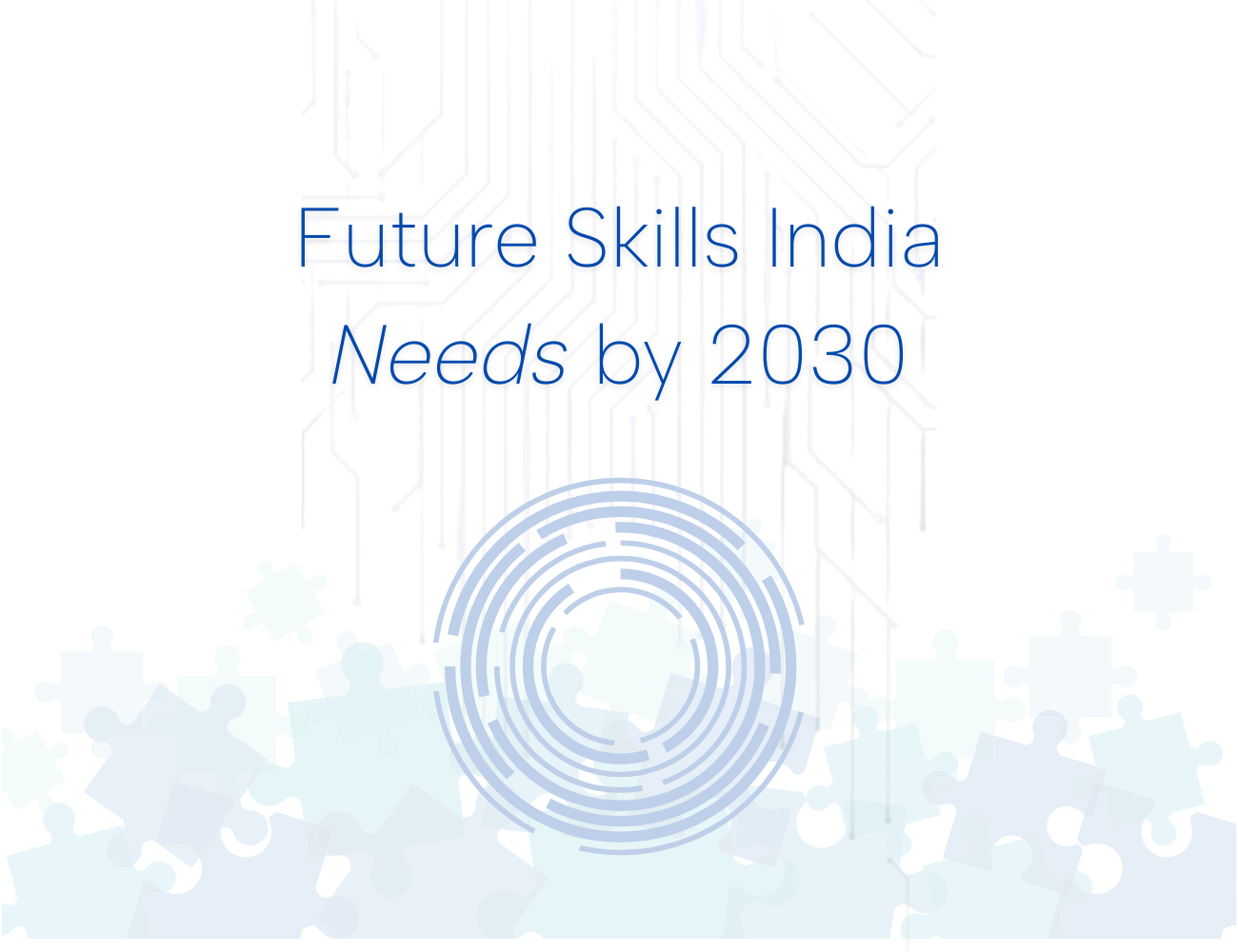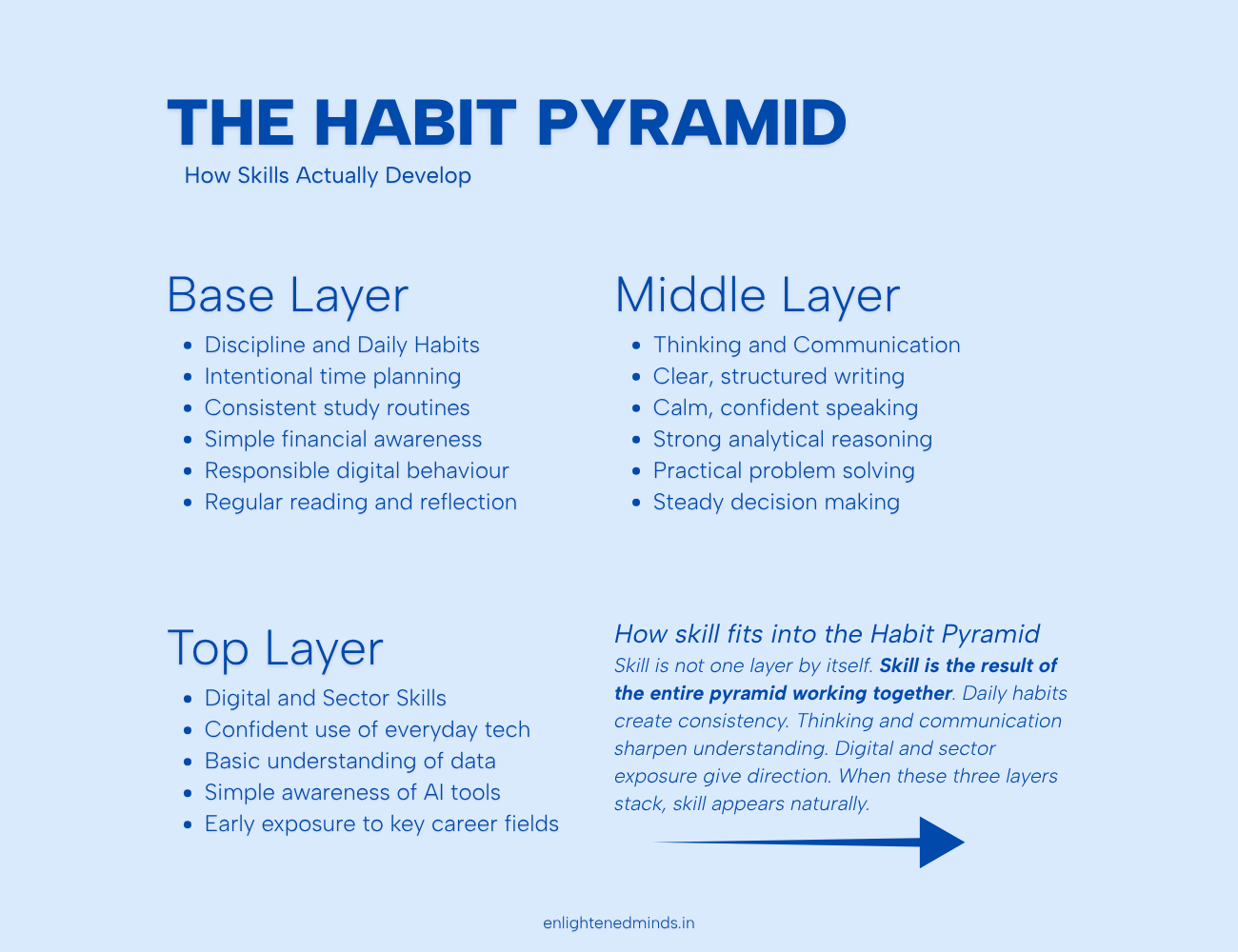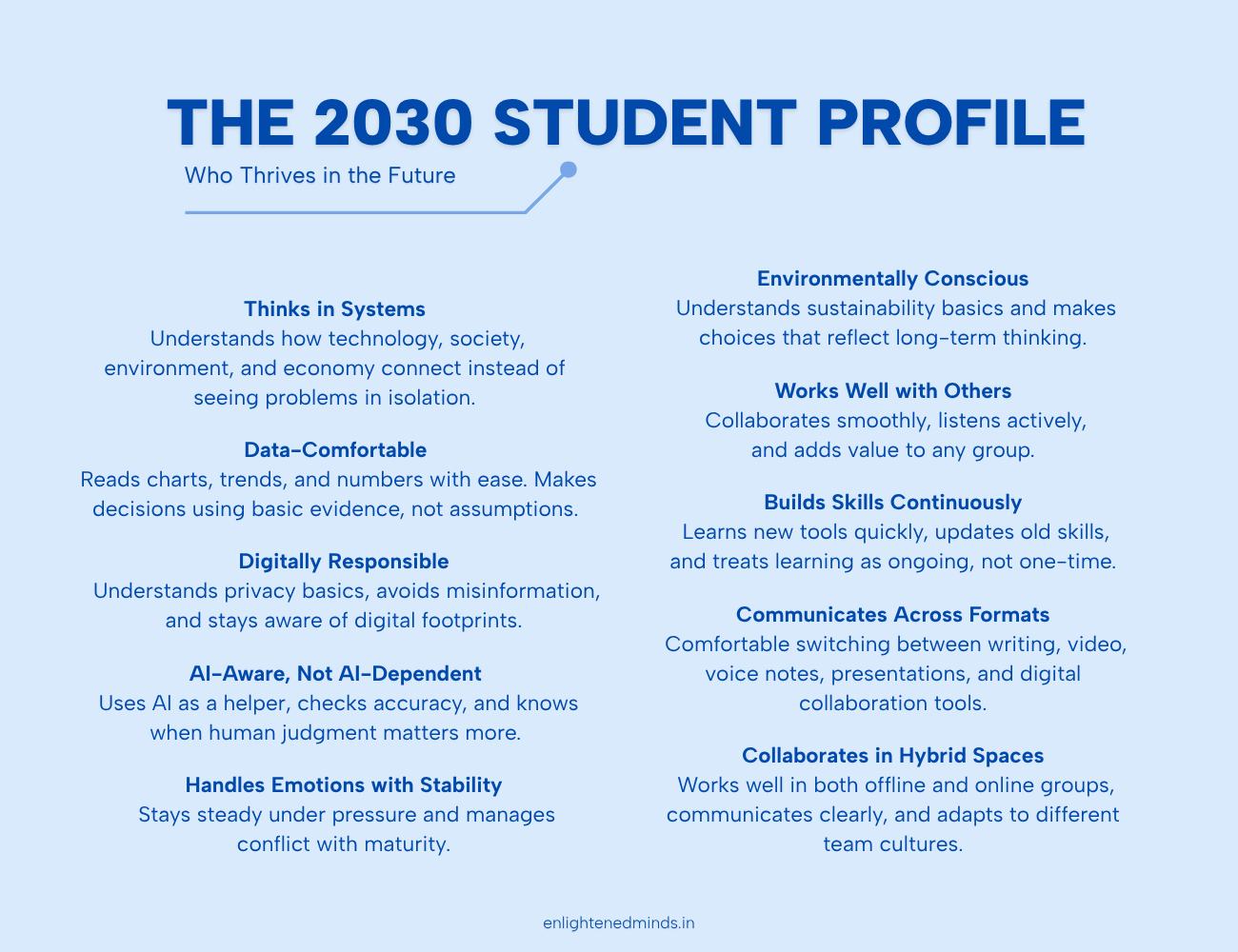
India is moving through one of its fastest transitions, and the students of today will step into a world that looks very different from the one their parents grew up in. New industries are rising, traditional careers are changing, and the expectations from young learners are no longer limited to high scores. What really matters now is the ability to think clearly, learn quickly, and apply knowledge in real situations.
For a student, this shift is not something to fear. It is a chance to grow with the world instead of chasing it from behind. When you build the right skills early, you do not just prepare for exams; you prepare for life. You learn how to work with new ideas, adjust to change, and stay confident even when things feel uncertain.
Future readiness is not about predicting the next big trend. It is about strengthening the abilities that will help you succeed in any field you choose. By understanding the skills India will need by 2030, students can start shaping their learning today in a way that feels purposeful and future aware.
List of – Jobs and Careers That Will Be in Demand in India by 2030
The India of 2030: What Students Should Expect
By 2030, India will be shaped by sharper competition, faster technology cycles, and a wider range of career paths than any previous generation has seen. Students entering this decade will walk into a country that rewards adaptability just as much as academic ability. The safest way to prepare is to understand what this new landscape looks like.
India’s growing sectors will offer opportunities across technology, healthcare, green energy, digital services, creative industries, logistics, and research. Many of these fields will demand skills that blend different disciplines. A student might study commerce but work in data-driven business roles, or come from a science background and find space in design or communication heavy jobs. This mix-and-match world is becoming the norm.
Automation will change how routine tasks are handled, but it will also create new responsibilities that require human judgment, creativity, and decision making. Students who can learn quickly and apply what they learn will stand out, no matter what they study in school.
The biggest shift is simple. Instead of preparing for one fixed career, students will prepare for a lifetime of learning. The ones who grow into this mindset early will have a clear advantage in the India of 2030.
Core Thinking Skills That Will Matter Everywhere
By 2030, the students who rise above the noise will be the ones who think with clarity. Knowledge will always matter, but the ability to understand problems, question ideas, and make sound decisions will matter even more. These thinking skills cut across every subject, every career, and every stage of life.
Critical thinking is the ability to step back, look at information calmly, and separate facts from assumptions. In a world filled with constant updates and half-true opinions, this becomes a survival skill. Students who practice this will not get overwhelmed. They will judge information with balance and act with confidence.
Analytical reasoning helps students break big problems into smaller, manageable parts. Whether it is solving a maths question, decoding a science concept, or understanding a real-life situation, this skill makes learning smoother and less stressful.
Creative problem solving is not only for artists. It is the skill that helps students think of fresh approaches when old methods don’t work. It teaches them to keep experimenting instead of giving up at the first sign of difficulty.
Decision making under uncertainty teaches students to be calm when things are unclear. Instead of waiting for perfect answers, they learn to choose wisely with what they know. This is one of the most important skills for adulthood.
These thinking skills are not built overnight. They grow through reading, discussion, curiosity, and practice. Students who start now will carry a quiet strength that helps them in both academics and life.
Digital and Tech Skills Students Should Not Ignore
By 2030, every student will be living and learning in a world shaped by technology, whether they choose a tech career or not. Digital skills are no longer optional. They are part of basic survival in academics, workplaces, and everyday life. The key is to move beyond clicking and scrolling, and start building real competence.
Digital literacy is the foundation. It means knowing how to use devices, apps, and online tools responsibly and efficiently. Students should be able to research properly, manage online tasks, and stay organised in their digital space. This is the minimum every learner needs.
Understanding AI is the next step. Students do not need to become coders, but they should know how AI works in simple terms, where it helps, and where it can mislead. Those who learn how to use AI safely and thoughtfully will outgrow those who use it blindly.
Basic data understanding gives students an edge across subjects. Whether it is interpreting graphs in science or analysing trends in commerce, the ability to read and understand data is becoming a core requirement. It helps students make informed choices instead of relying on guesses.
Cyber awareness is a life skill now. Students must know how to protect their privacy, avoid misinformation, and stay safe in digital spaces. These habits build long-term discipline and reduce risks that young learners often overlook.
The goal is simple. Students should not be afraid of technology, nor should they depend on it mindlessly. With steady practice, they can learn to use digital tools wisely and confidently, preparing themselves for a world where tech touches almost everything they do.

Skills don’t appear out of nowhere. They grow from steady habits, clear thinking, and the confidence to use new tools. This habit pyramid shows the simple truth: when the base is strong, every other part of learning becomes easier.
Communication Skills for a Connected India
By 2030, students will find themselves in a world where clear communication sets the pace for every opportunity. It does not matter how talented or knowledgeable someone is; if they cannot express ideas with clarity, they will always feel one step behind. Strong communication is not about sounding fancy. It is about being understood.
Clear writing is one of the most underrated strengths a student can build. Whether it is school assignments, emails, presentations, or future workplace tasks, good writing shows discipline, structure, and clarity of thought. Students who write well often think well.
Public speaking is not about giving speeches on a stage. It is the confidence to explain your thoughts in front of others without losing calm. Group discussions, interviews, class presentations, or even everyday conversations become far smoother when a student learns to speak with purpose.
Collaborative communication is the skill that makes teamwork effective. Students who can listen actively, share ideas respectfully, and respond thoughtfully become reliable team members. These habits make group projects easier and prepare them for the kind of teamwork every job now demands.
The truth is simple. Communication is the bridge between ideas and action. Students who practice it early will find learning easier, relationships stronger, and opportunities more achievable.
Social and Human Skills That Will Never Go Out of Demand
Even as technology grows sharper, the most valuable abilities will still be the human ones. By 2030, students who can understand people, handle emotions with maturity, and work well in groups will naturally stand out. These skills are not about being perfect or overly polite. They are about staying grounded and aware of how people think and feel.
Empathy helps students see situations from another person’s point of view. It builds patience, reduces conflict, and makes teamwork smoother. In classrooms, it encourages helpfulness. In careers, it builds trust. In life, it shapes strong relationships.
Teamwork teaches students how to contribute to a shared goal without losing their individuality. Knowing when to lead, when to support, and when to step back is a sign of maturity. Students who practice this early handle group work and future professional roles with a calm mind.
Conflict resolution is the quiet skill that prevents small issues from becoming big problems. Students who learn how to talk through disagreements, find common ground, and keep emotions steady will always be valued in any environment.
Emotional discipline is the ability to stay steady during stress, disappointment, or pressure. It does not mean hiding emotions. It means responding calmly instead of reacting impulsively. This one skill shapes academic performance, decisions, and personal well-being more than most students realise.
These human skills are lifelong strengths. They deepen character, improve judgment, and help students stay balanced even in fast-changing times.
Practical Skills for Everyday Growing Up
By 2030, students who manage their everyday responsibilities with confidence will naturally feel more in control of their future. These are not the skills taught directly in textbooks, yet they shape how smoothly a young person handles school, personal life, and early adulthood. Practical skills make students independent thinkers instead of constantly relying on others.
Financial literacy is a quiet advantage. Understanding how money works, how to budget, and how to save teaches students discipline and responsibility. Even simple habits, like tracking expenses or learning the basics of banking, build confidence that carries into adulthood.
Time management helps students balance studies, rest, and personal interests without constant stress. When a student learns to plan their day, break tasks into smaller parts, and avoid procrastination, everything else feels lighter. This one habit often becomes the difference between feeling overwhelmed and staying steady.
Project execution teaches students how to take an idea from start to finish. Whether it is a school assignment or a personal project, the ability to plan, organise, and complete work on time builds real-world readiness. Students learn patience, commitment, and the satisfaction of seeing something through.
Basic research skills help students find reliable information instead of getting lost in random opinions. Knowing how to read, compare, verify, and summarise information improves academic work and builds strong judgment in everyday decisions.
These practical skills seem simple, but they shape a student’s independence. When built early, they become lifelong habits that support learning, confidence, and personal growth.
Sector-Wise Skills Students Should Explore
By 2030, career paths will not stay locked inside narrow boxes. Students will mix interests, move across fields, and use skills from different domains to build their careers. Understanding what each sector expects helps students make informed choices instead of following trends blindly.
STEM fields will demand strong foundations in maths, science, and analytical reasoning. Students interested in engineering, research, medicine, or technology will benefit from curiosity-driven learning and the discipline to break complex ideas into simpler parts. Skills like coding, basic electronics, data interpretation, and scientific thinking can open many doors.
Business and commerce roles will continue expanding in finance, entrepreneurship, digital marketing, operations, and management. Students will need skills in decision making, communication, numerical reasoning, and understanding how markets work. Practical exposure through projects or real situations will strengthen their confidence.
Humanities and social sciences will grow in areas like communication, law, public policy, education, psychology, design, and cultural studies. Students in these paths benefit from strong writing, clear thinking, active observation, and the ability to understand people and society with depth.
Creative and design-led careers will rise across media, advertising, digital content, animation, product design, and communication arts. Students who enjoy creating, imagining, and building visual ideas can explore design tools, storytelling, sketching, photography, and layout thinking. Creativity becomes a serious skill when paired with discipline.
Each sector rewards a different mix of abilities, but all of them value curiosity, clarity of thought, and a willingness to learn. Students who explore early will find their strengths naturally and choose paths that feel purposeful rather than forced.

The students who thrive in 2030 will be the ones who mix clarity, digital confidence, emotional steadiness, and the ability to learn fast. This profile shows the traits that will matter long after today’s trends fade.
How Students Can Start Building Future Skills Today
The hardest part about skill building is knowing where to begin. Students often think they need special classes or expensive resources, but most future ready skills grow from simple habits practiced regularly. The goal is not perfection. It is steady improvement that builds confidence over time.
Small habits at home make a real difference. Reading for even fifteen minutes a day strengthens vocabulary, thinking, and focus. Helping with everyday tasks teaches responsibility and time sense. Discussing news or ideas with family builds awareness and clarity. These small actions shape strong foundations without pressure.
School activities offer practical learning if students approach them with intention. Group projects teach teamwork, presentations improve communication, and science or arts activities spark curiosity. Instead of seeing these tasks as routine work, students can use them to practise the skills the future demands.
Online and offline learning spaces can support growth when used wisely. Students can explore beginner friendly tools for coding, drawing, design, research, or writing. Libraries, clubs, workshops, and competitions add variety and make learning more hands on. The idea is to explore without feeling rushed.
Tracking personal growth helps students stay motivated. Instead of comparing themselves to others, they can check how consistent they are. A small notebook or digital journal works well. Noting what they learned, what they struggled with, and what they enjoyed gives clarity and helps them choose future paths more confidently.
Students who start with simple steps will be better prepared for the challenges of 2030. They grow not by chasing trends but by strengthening their abilities one day at a time.
Parents and Teachers: Their Role in Preparing the Next Generation
As India moves toward 2030, the guidance students receive at home and in school will shape how confidently they face new challenges. Parents and teachers do not need to predict the future. They simply need to create an environment where young learners feel supported, curious, and willing to try new things without fear.
Parents can help by encouraging exploration instead of focusing only on marks. When children are allowed to ask questions, try small projects, or learn new tools, they naturally build skills that go beyond textbooks. A calm, steady presence at home — one that values effort over perfection — allows students to grow at their own pace. Conversations about goals, choices, and everyday experiences help young learners understand themselves better.
Teachers play an equally important role. When classrooms become spaces where ideas are discussed openly, students feel free to think independently. Assignments that promote reasoning, creativity, and teamwork prepare students for real challenges rather than rote learning. Even small changes, like giving students room to explain their thought process, strengthen confidence and clarity.
Both parents and teachers shape habits that last much longer than any exam result. When they work together, students learn how to stay grounded, disciplined, and open minded — qualities that will matter in every decade, not just in 2030.
The Path Ahead
The world that students will step into by 2030 will be faster, more connected, and filled with choices that can feel overwhelming at first. But the truth is simple. Young people who build strong thinking skills, practical habits, and steady discipline will adapt far better than those who chase shortcuts or trends. Skills are not built in a single moment. They grow slowly through curiosity, consistent practice, and real experiences.
For students, the goal is not to prepare for one perfect opportunity. It is to become the kind of learner who can handle many opportunities over time. When you focus on clarity, confidence, and steady growth, your future stops feeling uncertain. It starts feeling open.
India’s next generation has the potential to shape new industries, create meaningful work, and solve problems that genuinely matter. By strengthening the right skills today, students give themselves the freedom to choose their own path tomorrow. This is the real meaning of future readiness — not prediction, but preparation rooted in everyday learning.
